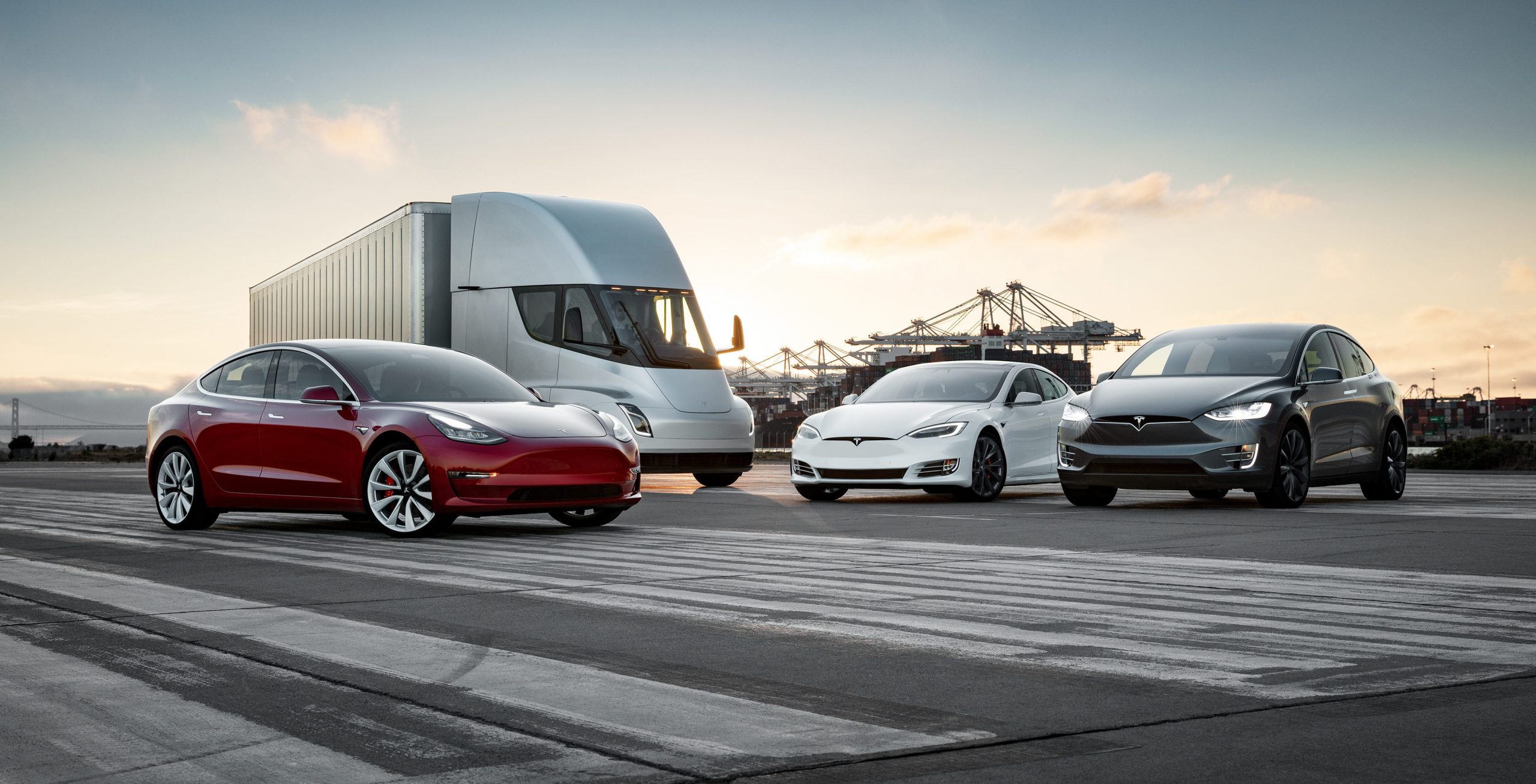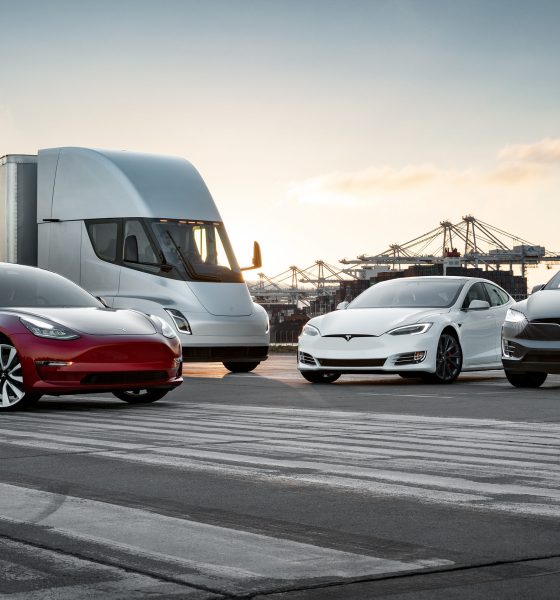

Investor's Corner
The ‘Tesla Effect’ is starting to extend from legacy carmakers to the oil industry
Back in February, self-made billionaire Don Gao from China mentioned that the “Tesla Effect” continues to grow even in markets beyond the California-based company’s reach. Gao, who owns Positec – a maker of power equipment – uses lithium-ion batteries for his company’s products, and they are steadily becoming a potent rival for heavyweight brands like Black & Decker. The billionaire entrepreneur noted that Tesla’s commitment to battery tech is spilling over into other industries, to the point where consumers’ perception of battery-powered devices is now changing.
“This Tesla Effect is a major trend and has really changed consumers’ perception of things that are battery driven and their capabilities,” he said.
Tesla did not come up with the electric car, nor did it come up with lithium-ion batteries. Both technologies were present even before the company was founded. That said, and partly thanks to the unraveling of Elon Musk’s first Master Plan, Tesla was able to capture an audience and a dedicated consumer base with its first vehicle – the Tesla Roadster. The small sports car was mostly a proof-of-concept, in the way that it was intended to show that electric cars need not be boring or limited in range. The car was successful enough that Tesla was able to follow it up with the Model S, a vehicle designed from the ground up to be a high-performance, long-range electric car. The rest is history.
Tesla’s electric cars were able to capture the interest of car buyers, even those that are particular about power and performance. It should be noted that Tesla’s electric cars were showing strong sales even before the company rolled out features like Autopilot. The company’s electric vehicles, from the Model S, to the Model X, to the Model 3, were desirable simply because they were excellent cars. They just happen to be powered by electricity instead of gas.

Since Tesla is still in the process of growing, its electric cars have been competing in the luxury segment. The electric vehicles themselves are not traditional luxury cars, with their minimalistic and almost spartan interiors, but they do provide a premium experience through their deep integration of software and hardware. Over the years, Tesla’s electric cars sold well, until such time that they started outselling mainstays from legacy carmakers like BMW and Mercedes-Benz. The Tesla Model 3, the company’s first attempt at a mass-market car, was recently listed as the 4th best-selling passenger car in the US, beating out competitors from the luxury midsize segment like the Mercedes-Benz C-Class.
In the same way that companies unrelated to Tesla are starting to explore the potential of lithium-ion batteries partly due to the electric car maker, a number of legacy automakers have accelerated their transition to electrified transport as well. Among the German carmakers, several have expressed their intent to come up with their own premium electric vehicles. Mercedes-Benz has the EQ program, Volkswagen just announced that it is investing ~$7 billion into e-mobility, and Porsche has the Taycan, a high-performance electric car that’s set to meet the Model S head-on in the premium EV market. Most of these carmakers would likely not acknowledge it, but there is little doubt that the transition to electrified transport was expedited by the efforts of a small electric car startup from Silicon Valley.
In a way, the Tesla Effect is happening at the perfect time. Several regions in the world are shifting towards cleaner forms of transportation. China plans to eventually ban diesel and gasoline-powered cars in its major cities. France and Britain have both committed to banning gas-powered automobiles in the future as well. Earlier this month, the EU Parliament voted for a 20% cut in CO2 emissions from new cars and vans in 2025 and a 40% reduction in 2030, accelerating the region’s transition towards cleaner transport. To effectively support the transition, carmakers, from startups like Tesla to pedigreed veterans like Mercedes-Benz, have to ramp their efforts at creating even more compelling, cost-effective electric vehicles.

In a recent segment on CNBC, Paul Sankey of Mizuho Securities mentioned that the “Tesla Effect” is starting to make its way to the oil industry as well. Last Thursday, oil prices tumbled as much as 4% amidst concerns about the fallout from the United States’ sanctions on Iran, the OPEC’s third-biggest crude oil producer. Wall St. analysts noted that oil could be in striking distance of $100 per barrel – an adjustment that would be felt by owners of fossil fuel-powered cars. The Mizuho analyst noted that part of the reasons behind the struggles of the oil industry is the shifting perception towards oil itself.
“Essentially, the big issue is the so-called “Tesla Effect,” the general “End of the Oil Age” theme that is a problem for these (oil) stocks. As the oil price goes up, especially to the levels we’re at now and potentially beyond, it’s almost as if the Tesla Effect could be exacerbated by the potential for higher oil prices to accelerate the end of the Oil Age. The Tesla Effect is the overall concept that (while) the 20th century was driven by oil, the 21st century will be driven by electricity. There’s a 30-year transition, and we’re somewhere probably 10 years into that transition. Ultimately, (the) terminal value of oil has been severely affected by the potential for us to change behavior,” the analyst said.
What is quite remarkable is that Tesla is nowhere close to reaching the company’s overall goals. Elon Musk once noted that Tesla would not stop until all cars in the road are electric. And the truth is, even if the company reaches its production targets for the Model 3 and the Model Y and its future Truck and compact sedan, Tesla would not be able to transition the auto industry towards electrification on its own. What Tesla could do, though, is to accelerate this transition, and if recent projects by legacy carmakers are any indication, it appears that the Silicon Valley-based company is doing just that.

Elon Musk
Tesla stock gets latest synopsis from Jim Cramer: ‘It’s actually a robotics company’
“Turns out it’s actually a robotics and Cybercab company, and I want to buy, buy, buy. Yes, Tesla’s the paper that turned into scissors in one session,” Cramer said.

Tesla stock (NASDAQ: TSLA) got its latest synopsis from Wall Street analyst Jim Cramer, who finally realized something that many fans of the company have known all along: it’s not a car company. Instead, it’s a robotics company.
In a recent note that was released after Tesla reported Earnings in late January, Cramer seemed to recognize that the underwhelming financials and overall performance of the automotive division were not representative of the current state of affairs.
Instead, we’re seeing a company transition itself away from its early identity, essentially evolving like a caterpillar into a butterfly.
The narrative of the Earnings Call was simple: We’re not a car company, at least not from a birds-eye view. We’re an AI and Robotics company, and we are transitioning to this quicker than most people realize.
Tesla stock gets another analysis from Jim Cramer, and investors will like it
Tesla’s Q4 Earnings Call featured plenty of analysis from CEO Elon Musk and others, and some of the more minor details of the call were even indicative of a company that is moving toward AI instead of its cars. For example, the Model S and Model X will be no more after Q2, as Musk said that they serve relatively no purpose for the future.
Instead, Tesla is shifting its focus to the vehicles catered for autonomy and its Robotaxi and self-driving efforts.
Cramer recognizes this:
“…we got results from Tesla, which actually beat numbers, but nobody cares about the numbers here, as electric vehicles are the past. And according to CEO Elon Musk, the future of this company comes down to Cybercabs and humanoid robots. Stock fell more than 3% the next day. That may be because their capital expenditures budget was higher than expected, or maybe people wanted more details from the new businesses. At this point, I think Musk acolytes might be more excited about SpaceX, which is planning to come public later this year.”
He continued, highlighting the company’s true transition away from vehicles to its Cybercab, Optimus, and AI ambitions:
“I know it’s hard to believe how quickly this market can change its attitude. Last night, I heard a disastrous car company speak. Turns out it’s actually a robotics and Cybercab company, and I want to buy, buy, buy. Yes, Tesla’s the paper that turned into scissors in one session. I didn’t like it as a car company. Boy, I love it as a Cybercab and humanoid robot juggernaut. Call me a buyer and give me five robots while I’m at it.”
Cramer’s narrative seems to fit that of the most bullish Tesla investors. Anyone who is labeled a “permabull” has been echoing a similar sentiment over the past several years: Tesla is not a car company any longer.
Instead, the true focus is on the future and the potential that AI and Robotics bring to the company. It is truly difficult to put Tesla shares in the same group as companies like Ford, General Motors, and others.
Tesla shares are down less than half a percent at the time of publishing, trading at $423.69.
Elon Musk
Tesla to a $100T market cap? Elon Musk’s response may shock you

There are a lot of Tesla bulls out there who have astronomical expectations for the company, especially as its arm of reach has gone well past automotive and energy and entered artificial intelligence and robotics.
However, some of the most bullish Tesla investors believe the company could become worth $100 trillion, and CEO Elon Musk does not believe that number is completely out of the question, even if it sounds almost ridiculous.
To put that number into perspective, the top ten most valuable companies in the world — NVIDIA, Apple, Alphabet, Microsoft, Amazon, TSMC, Meta, Saudi Aramco, Broadcom, and Tesla — are worth roughly $26 trillion.
Will Tesla join the fold? Predicting a triple merger with SpaceX and xAI
Cathie Wood of ARK Invest believes the number is reasonable considering Tesla’s long-reaching industry ambitions:
“…in the world of AI, what do you have to have to win? You have to have proprietary data, and think about all the proprietary data he has, different kinds of proprietary data. Tesla, the language of the road; Neuralink, multiomics data; nobody else has that data. X, nobody else has that data either. I could see $100 trillion. I think it’s going to happen because of convergence. I think Tesla is the leading candidate [for $100 trillion] for the reason I just said.”
Musk said late last year that all of his companies seem to be “heading toward convergence,” and it’s started to come to fruition. Tesla invested in xAI, as revealed in its Q4 Earnings Shareholder Deck, and SpaceX recently acquired xAI, marking the first step in the potential for a massive umbrella of companies under Musk’s watch.
SpaceX officially acquires xAI, merging rockets with AI expertise
Now that it is happening, it seems Musk is even more enthusiastic about a massive valuation that would swell to nearly four-times the value of the top ten most valuable companies in the world currently, as he said on X, the idea of a $100 trillion valuation is “not impossible.”
It’s not impossible
— Elon Musk (@elonmusk) February 6, 2026
Tesla is not just a car company. With its many projects, including the launch of Robotaxi, the progress of the Optimus robot, and its AI ambitions, it has the potential to continue gaining value at an accelerating rate.
Musk’s comments show his confidence in Tesla’s numerous projects, especially as some begin to mature and some head toward their initial stages.
Elon Musk
Tesla director pay lawsuit sees lawyer fees slashed by $100 million
The ruling leaves the case’s underlying settlement intact while significantly reducing what the plaintiffs’ attorneys will receive.

The Delaware Supreme Court has cut more than $100 million from a legal fee award tied to a shareholder lawsuit challenging compensation paid to Tesla directors between 2017 and 2020.
The ruling leaves the case’s underlying settlement intact while significantly reducing what the plaintiffs’ attorneys will receive.
Delaware Supreme Court trims legal fees
As noted in a Bloomberg Law report, the case targeted pay granted to Tesla directors, including CEO Elon Musk, Oracle founder Larry Ellison, Kimbal Musk, and Rupert Murdoch. The Delaware Chancery Court had awarded $176 million to the plaintiffs. Tesla’s board must also return stock options and forego years worth of pay.
As per Chief Justice Collins J. Seitz Jr. in an opinion for the Delaware Supreme Court’s full five-member panel, however, the decision of the Delaware Chancery Court to award $176 million to a pension fund’s law firm “erred by including in its financial benefit analysis the intrinsic value” of options being returned by Tesla’s board.
The justices then reduced the fee award from $176 million to $70.9 million. “As we measure it, $71 million reflects a reasonable fee for counsel’s efforts and does not result in a windfall,” Chief Justice Seitz wrote.
Other settlement terms still intact
The Supreme Court upheld the settlement itself, which requires Tesla’s board to return stock and options valued at up to $735 million and to forgo three years of additional compensation worth about $184 million.
Tesla argued during oral arguments that a fee award closer to $70 million would be appropriate. Interestingly enough, back in October, Justice Karen L. Valihura noted that the $176 award was $60 million more than the Delaware judiciary’s budget from the previous year. This was quite interesting as the case was “settled midstream.”
The lawsuit was brought by a pension fund on behalf of Tesla shareholders and focused exclusively on director pay during the 2017–2020 period. The case is separate from other high-profile compensation disputes involving Elon Musk.








